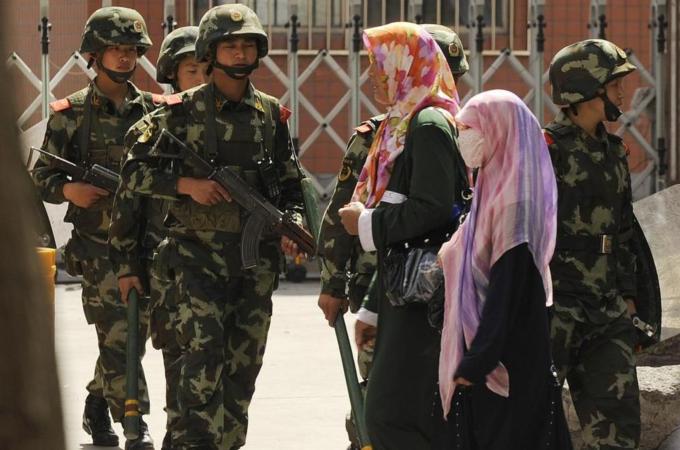A series of recent reports by journalists and research institutes—notably one filed from Kazakhstan by the AP’s Gerry Shih, and another report by the European School of Culture and Theology’s Adrian Zenz—describes a system of political camps in Xinjiang being used to “reeducate” Muslim residents, including Uyghurs, Kazakhs, and Kyrgyz. At Jacobin, David Brophy situates the existence and use of these camps (which the government has denied) into the wider use of harassment, intimidation, and religious discrimination of Uyghurs amid a long-running anti-terrorism campaign in Xinjiang:
The emergence in Xinjiang of a new network of political reeducation camps has been a poorly kept secret for some time. But research and reporting is giving us hard evidence of the scale of this new policy. Since the middle of 2017, a major construction boom has thrown up a variety of detention centers and prisons whose inmates number in the hundreds of thousands. These camps combine many of the brute horrors of China’s earlier reeducation-through-labor system with the latest high-tech surveillance and monitoring mechanisms.
[…] The camps are only the culmination of a series of repressive policy innovations introduced by party secretary Chen Quanguo since his arrival in Xinjiang in 2016. Many of these were already evident on a trip I made to Xinjiang last year: police stations at every major intersection, ubiquitous checkpoints where Chinese sail through as Uyghurs line up for humiliating inspections, elderly men and women trudging through the streets on anti-terror drills, television and radio broadcasts haranguing the Uyghurs to love the party and blame themselves for their second-class status.
[…] Even for a region where actual ethnic relations have rarely lived up the harmonious scenes of party propaganda, this is a historic low point. How did a revolutionary state, which came to power promising to end all forms of national discrimination, end up resorting to such horrific policies? And what, if anything, can those of us outside China do to help turn things around? […] [Source]
Brophy’s report includes a historical outline of the political status of the Xinjiang region, known as East Turkestan to many Uyghurs; a description of advocacy efforts from abroad, which he notes “has made it all too easy for Beijing to portray Uyghur discontent as the product of a hostile Western conspiracy”; and suggests an “alternate approach” which requires “people speaking up for the Uyghurs […] to take a strong stand against the dehumanizing treatment of Muslims by the West and its allies.”
Amid the years-running anti-terror campaign that has focused mostly on Xinjiang, Beijing has also turned the region into a testbed for new high-tech surveillance technologies. This has contributed to making Xinjiang what Zenz had earlier called “perhaps the most heavily policed region on the planet.” Zenz’s more recent report also provided evidence of biometric data collection that has been denied by officials, which was summerarized last month by the Jamestown Foundation.
Alongside a broader global survey of surveillance-related issues, The Economist reported this week that the convergence of modern technology and Beijing’s quest for ultimate control of its population have turned Xinjiang into “a police state like no other”:
At a large checkpoint on the edge of Hotan a policeman orders everyone off a bus. The passengers (all Uighur) take turns in a booth. Their identity cards are scanned, photographs and fingerprints of them are taken, newly installed iris-recognition technology peers into their eyes. Women must take off their headscarves. Three young Uighurs are told to turn on their smartphones and punch in the passwords. They give the phones to a policeman who puts the devices into a cradle that downloads their contents for later analysis. One woman shouts at a policeman that he is Uighur, why is he looking at her phone?
There can be four or five checkpoints every kilometre. Uighurs go through them many times a day.
[…] Under a system called fanghuiju, teams of half a dozen—composed of policemen or local officials and always including one Uighur speaker, which almost always means a Uighur—go from house to house compiling dossiers of personal information. Fanghuiju is short for “researching people’s conditions, improving people’s lives, winning people’s hearts”. But the party refers to the work as “eradicating tumours”. The teams—over 10,000 in rural areas in 2017—report on “extremist” behaviour such as not drinking alcohol, fasting during Ramadan and sporting long beards. They report back on the presence of “undesirable” items, such as Korans, or attitudes—such as an “ideological situation” that is not in wholehearted support of the party. […] [Source]
Read more about the crackdown on terrorism in Xinjiang, or the development of high-tech surveillance equipment—including the role that Xinjiang plays as a realm for pilot testing this technology and several views on the trend, via CDT.







